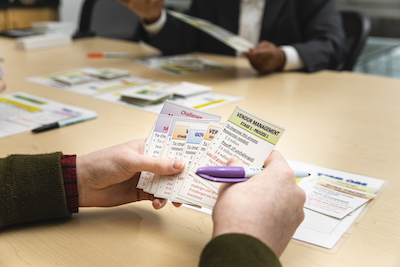In This Story

The idea came to him in the middle of the night during a cruise with family and friends. He spent the next day in the cabin, writing out the rules for a novel business strategy board game.
Despite being on vacation, Mahesh P. Joshi, associate professor of global strategy and entrepreneurship at George Mason University’s School of Business, recruited his family and friends to test out the card game. In the middle of playing, Raj S. Davé, a family friend and patent lawyer, suddenly said, “We need everyone to sign confidentiality agreements before we continue playing.”
And that’s how Joshi knew he had invented something different. In December 2019, the U.S. Patent and Trademark Office agreed and granted a patent for BiggieBills, a complex interactive strategy game designed for executive training, company retreats and business classes. BiggieBills will be available for licensing agreements in May, once the game is digitalized.
“The idea that I should create a game to help people better understand complex business strategy had been festering in my brain for a while,” said Joshi. “But the details of what that game would be came together at once, and I had to rush to get it down.”

Joshi was the founding director of Mason’s Center for Innovation and Entrepreneurship and recently served as its director of research and practice. In addition to teaching Mason students and research, Joshi advises and provides consulting to the public-sector, private-sector and not-for-profit organizations about corporate entrepreneurship and strategic and cross-cultural business management.
Joshi is introducing BiggieBills in the classes he teaches, including executive training sessions for companies and government agencies. In addition, he’s marketing the game to other business schools and executive training programs.
BiggieBills is a “team game that is fast paced, has an explicit goal and evolves in a dynamic competitive context,” said Roy W. Hinton, former associate dean of executive education at the School of Business who encouraged Joshi to develop BiggieBills. “It generates great team discussions about appropriate moves, and players quickly see the impact of their decisions.”
BiggieBills is played in teams, and can be adapted to include as many as 50 players. Each team takes on the role of an established business trying to gain the top position in a chosen industry. The standard game lasts about three hours, and a crucial point in the learning process occurs when the game facilitator debriefs at the end.
The game is focused on business strategy, but can be modified to include other topics, such as entrepreneurship, new product development and sales management. The two main ways to win are to be the first team to earn a billion dollars or to be the last remaining team standing after all others have declared bankruptcy.
Davé, president of the Davé Law Group in Alexandria, Virginia, said that the game is a teaching tool that is fun to play.
“Why is it fun? It’s influenced by luck and strategy, just like life. You can win or lose, just like in life,” said Davé, who helped Joshi obtain the patent on his game.
Joshi said he created BiggieBills after searching for years for an interactive strategy game to use in his class, but not liking what he found.
“There’s no game like this around,” said Joshi. “If there had been, I would have used it in my classes, and wouldn’t have had to invent it.”
